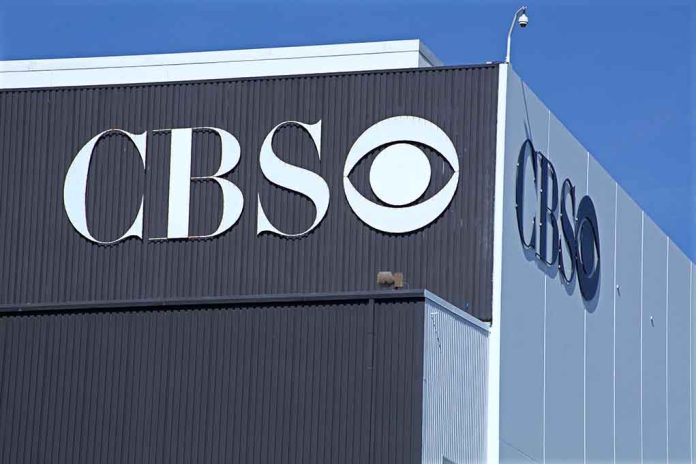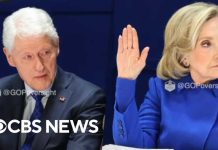
President Donald Trump demands CBS cancel “60 Minutes” over alleged editing of Kamala Harris interview, igniting a fierce debate on media accuracy and political representation.
Key Takeaways
- Trump filed a $10 billion lawsuit against “60 Minutes,” claiming they misled voters by editing Harris’ interview.
- CBS released unedited transcripts, asserting the broadcast was not doctored or deceitful.
- The FCC has requested tapes and transcripts, with discrepancies in edits being a focal point.
- Legal experts suggest the lawsuit lacks substantial legal merit.
- Paramount Global, CBS News’ parent company, is considering a settlement to facilitate a sale to Skydance Media.
Trump’s Explosive Allegations Against CBS
In a surprising turn of events, President Donald Trump has called for the cancellation of CBS’s long-running news program “60 Minutes.” This demand comes in the wake of a $10 billion lawsuit filed by Trump against the show in November, alleging that the program misled voters by manipulating an interview with Vice President Kamala Harris. The president’s claims have reignited debates about media transparency and journalistic integrity in political reporting.
Trump’s allegations are severe, accusing CBS of replacing Harris’ original answers with different ones, effectively charging the network with election interference and fraud. These claims have sent shockwaves through both political and media circles, prompting discussions about the responsibility of news organizations in presenting accurate and unbiased information to the public.
“CBS and 60 Minutes defrauded the public by doing something which has never, to this extent, been seen before. They 100% removed Kamala’s horrible election changing answers to questions, and replaced them with completely different, and far better, answers, taken from another part of the interview. This was Election changing “stuff,” Election Interference and, quite simply, Election Fraud at a level never seen before. CBS should lose its license, and the cheaters at 60 Minutes should all be thrown out, and this disreputable “NEWS” show should be immediately terminated. With the new Democrat scandal that just arose with respect to USAID illegally paying large sums of money to Politico and other media outlets, the question must me asked, was CBS paid for committing this FRAUD??? Many other questions to come! This will go down as the biggest Broadcasting SCANDAL in History!!!,” Trump wrote on Truth Social.
I watched the full, unedited video of the Kamala Harris interview + reviewed the full transcript as well as the segment that aired on CBS News.
I would encourage everyone who cares about fact driven journalism to do the same.@60Minutes did then-VP Harris a favor in the edit… pic.twitter.com/dna0iRno0W
— Catherine Herridge (@C__Herridge) February 6, 2025
CBS’s Response and FCC Involvement
In response to Trump’s allegations, CBS has taken steps to defend its journalistic practices. The network released unedited transcripts of the Harris interview, asserting that the broadcast was neither doctored nor deceitful. This move aims to maintain the integrity of “60 Minutes” and counter Trump’s claims of manipulation.
The Federal Communications Commission (FCC) has stepped into the fray, requesting tapes and transcripts related to the interview. The focus of their inquiry appears to be on potential discrepancies in the editing process. This involvement by a federal regulatory body underscores the seriousness of the allegations and their potential implications for broadcast standards.
Divided Opinions Within the FCC
The controversy has revealed a divide within the FCC itself. Republican FCC head Brendan Carr has expressed concern over CBS’s conduct, suggesting that there might be merit to Trump’s claims. On the other hand, Democratic FCC commissioner Anna Gomez sees no evidence of rule violations, highlighting the political nature of the debate.
“This is a rare situation where we have extrinsic evidence that CBS had played one answer or one set of words and then swapped in another set. And CBS’s conduct through this, frankly, has been concerning,” said Carr.
This internal disagreement within the FCC reflects the broader national debate on media bias and the role of news organizations in shaping public opinion. It also highlights the challenges faced by regulatory bodies in navigating the complex landscape of modern media and politics.
“The transcript and footage of this interview provide no evidence that CBS and its affiliated broadcast stations violated FCC rules. Having now seen these materials, I see no reason to continue pursuing this investigation. The FCC should now move to dismiss this fishing expedition to avoid further politicizing our enforcement actions,” said Gomez.
Potential Settlement and Industry Impact
As the legal battle unfolds, reports suggest that Paramount Global, the parent company of CBS News, is considering a settlement. This potential move is reportedly aimed at facilitating a sale to Skydance Media. However, key figures within CBS, including “60 Minutes” executive producer Bill Owens and CBS executive Wendy McMahon, are opposing any settlement, emphasizing the importance of maintaining journalistic integrity.
The outcome of this controversy could have far-reaching implications for the media industry. It raises questions about the balance between editorial discretion and faithful representation of interviews, especially those involving high-profile political figures. As the situation develops, it will likely continue to fuel discussions about media ethics, political influence, and the public’s right to unbiased information.









